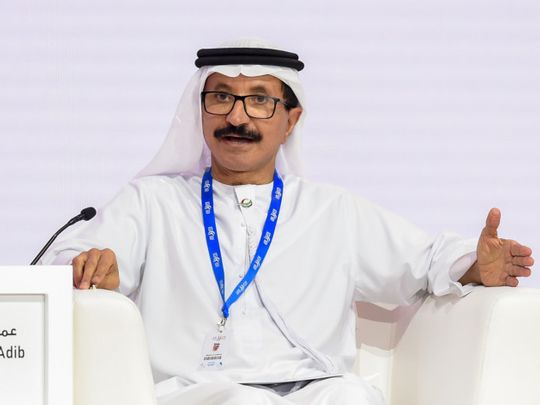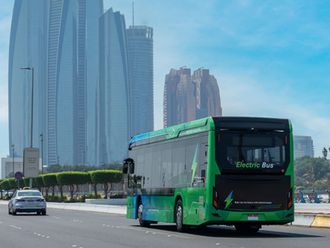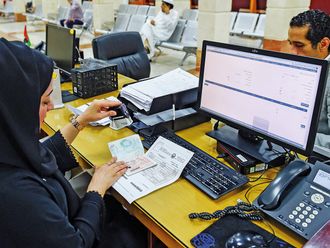
Dubai: The development of the India — Middle East — Europe Economic Corridor (IMEC), unveiled at the G20 Summit two weeks ago, will not threaten established maritime routes like the Suez Canal, Sultan Ahmed Bin Sulayem, Group Chairman and CEO of DP World told gathering at the Arab Media Forum in Dubai on Tuesday.
Such corridors, he added, would enhance supply chain resilience. “For example, in 2021, the Suez Canal was blocked for six days by Ever Given [a container ship that had run aground in the canal]. The blockage had a cascading effect and ended up paralysing trade for three months,” said Al Sulayem.
“Economic corridors [such as the IMEC] offer an alternative land-based route, reducing the risk associated with maritime transport,” add the DP World Chief.
Arab Media Forum being held in Dubai from September 26 and 27 is the region’s largest gathering for media professionals being organised by the Dubai Press Club under the theme ‘The Future of Arab Media,’. More than 3,000 delegates from around the world are participating in the AMF.
read more from arab media forum
- Dubai is a platform for the future of media industry: Sheikh Mohammed
- Arab Media Forum: DEWA signs agreement with Dubai Media Incorporated to boost cooperation ahead of COP28
- Arab Media Forum 2023: ‘Ertugrul’ actor Engin Altan Düzyatan could star in a Dubai production
- AMF: Dubai Media Council signs MoU with Egypt to boost cooperation in the media sector
The shipping and logistics giant is also actively exploring options to optimise the maritime line between Eastern Asia and Europe. “Our focus is on maintaining speed and reliability in supply chains,” he said.
Following the G20 Summit, the UAE announced it would work alongside the governments of Saudi Arabia, Member States of the European Union, India, and the United States on the IMEC.
Diversifying transport options
“Economic corridors, although not a new concept, play a crucial role in facilitating the movement of commodities from India to the Gulf region and beyond,” said Al Sulayem. More than 80 per cent of global commodities are shipped by sea.
“The goal is to diversify our transportation methods, offering better and faster options for delivery to Europe. While maritime shipping remains the dominant mode, trains offer cost-effective alternatives for certain routes.,” he added.
He said the company is currently exploring ways to harness the potential of trains and railways in the UAE and KSA to expand DP World’s shipping operations.
Cost reduction
Bolstering supply chains is the need of the hour, especially after the pandemic exposed vulnerabilities in the global supply chain. The issues were heightened after the Russia- Ukraine war. “Shipping costs skyrocketed during this period. For example, the costs to ship a container from China to the UAE during the crisis skyrocketed from $2,500 to $3,000, up to $15,000. That’s why diversifying the means of transportation is important during times of crises,” he said.
Ports were often closed, and the scarcity of empty containers was also a significant challenge. “To address this, we’ve invested in storage facilities and digital distribution systems to enhance supply chain resilience,” he added.
Securing supply chains
Recognizing the impact of external factors on the company’s operations, Al Sulayem said DP World made strategic decisions to secure their supply chain. “Between 2016 and 2021, we invested a significant sum, approximately $6 billion, to acquire companies that could enhance our supply chain capabilities,” he said.
The company’s investments ranged from Indian railways and logistics companies to improving railway infrastructure in India. Al Sulayem said this was particularly important given the complexities of truck-based shipping in India.
Last month, DP World signed a concession agreement with the Deendayal Port Authority to develop, operate and maintain a new 2.19 million TEU per annum mega-container terminal at Kandla in Gujarat on India’s western coast.
$6 billion boost
DP World spent over $6 billion to evolve into a comprehensive supply chain player, Bin Sulayem also said.
Speaking about DP World's transformation from a traditional ports operator into a major player in the global supply chain, Bin Sulayem said: “In 2016, it became evident to us that factors beyond the confines of ports exerted a notable influence on the punctual delivery of cargo. Faced with this revelation, we made a resolute and forward-thinking decision. Our commitment was unwavering: to provide the most exceptional service to our cargo owners, guaranteeing both timeliness and cost-effectiveness in their operations”.
Consequently, DP World resolved to extend its services across the entire supply chain. “We transformed our role from merely operating ports to becoming a global leader in smart end-to-end supply chain logistics, facilitating worldwide trade flows," Bin Sulayem remarked.
This required a massive investment of more than $6 billion, which encompassed the acquisition of new companies worldwide spanning various segments of the supply chain, from warehouse storage to transportation. DP World is now the largest transportation company in India following the privatisation of the sector by the Indian government, even owning a major rail network to move goods across the country.
Bin Sulayem added that the slow evolution of the supply chain industry led the company to invest in every aspect of the chain. The company is now renowned for its exceptional efficiency, and has become a benchmark for shipping companies when it comes to the swift and efficient loading and offloading of containers, Bin Sulayem noted.
DP World has undertaken substantial investments spanning multiple countries across the globe, with a commitment to persist in this strategy wherever viable opportunities arise, he added.
The company’s operations which span 73 countries around the world, including several Arab countries. Its first venture outside the UAE was in Saudi Arabia, winning a concession to operate the South Container Terminal at Jeddah Islamic Port. DP World signed a new 30-year concession agreement with Saudi Arabia’s Mawani in 2019 and is planning to invest more than $800 million to expand and modernise the terminal, taking capacity to 5 million TEU. It is also investing in a new $500 million logistics park to support Saudi Arabia’s vision 2030.
DP World also has operations in Egypt, where it has transformed Sokhna’s capability since taking over in 2008, focusing on efficiency and sustainability, and Algeria, where it has invested nearly $130 million in the ports of Djazair and Djen-Djen since 2009.
Earlier this year, DP World launched the first direct freight service between the UAE and Iraq to make the flow of goods between the two countries faster, safer and more efficient. Until now, goods had to be transported by road from the UAE – which meant passing through multiple countries and borders with journeys taking up to two weeks. DP World designed and built vessels to take cargo directly from Jebel Ali to Umm Qasr port in Southern Iraq, so goods can be delivered in just 36 hours.








